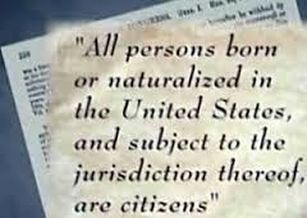 US Constitution 14th Amendment US Constitution 14th Amendment Admittedly legal scholars, however, have disagreed over whether the Wong Kim Ark precedent applies when alien parents are in the country illegally. Congress can act outside of the US Supreme Court by restricting birthright citizenship in two ways. First by statutory redefinition of the term jurisdiction, or by overriding both the Wong Kim Ark ruling and the Citizenship Clause itself through an amendment to the Constitution, but no such proposal has been broached because the process could take years and the political repercussions to legislators is untenable. The current interest in punitive measures to deny citizenship took root in the Great Recession of 2008 when unemployment percentages skyrocketed and fear spread that immigrants were taking jobs away from Americans. It’s a phenomenon that has propelled itself into the current Republican discourse as an appeasement to extremist right-wing conservatives, although some could say the scapegoating of immigrants never left. Those who argue for retracting citizenship for children of undocumented immigrants with an amendment need to consider the international law implications. Setting aside the inhumanity and insensitivity of not recognizing children born here as citizens, questions regarding the legality for denying citizenship under international human rights norms could be applicable to the United States. In a position paper from Harvard University published in the Human Rights Journal Vol. 25 in 2009 “Born in the Americas: Birthright Citizenship and Human Rights,” Katherine Culliton-Gonzalez argues revocation of birthright citizenship disparately impacts certain racial or ethnic minority groups and might violate human rights law. Retrogression of birthright citizenship, she says, cannot be substantiated just because other countries do not or have not provided it to all children of undocumented immigrants. International law allows sovereign countries to design their own laws and rules regarding citizenship, but retrogression is problematic under international law. The Dominican Republic is one of the few nations in the Americas that denies birthright citizenship to the children of unauthorized immigrants. This concept was tested in 2005 in the Dominican Republic in the case of Dilcia Yean and Violeta Bosico v. Dominican Republic. The Inter-American Court of Human Rights found that “while the Dominican Republic had the right to enact its own citizenship rules, those rules were also subject to norms providing for the right to a nationality, especially for children, as well as the right to freedom from discrimination,” argues Gonzalez. The Dominican Republic amended its constitution in 2010 to retract birthright citizenship entirely from children of undocumented immigrants; however, this was immediately challenged by a Haitian who was born in the Dominican Republic. The decision of the Inter-American Court in the case of Yean and Bosico children made it clear that any retraction of birthright citizenship displaying discrimination is legally questionable under human rights’ law. Conclusion Three out of four unauthorized immigrants in the US are Hispanic and retraction of birthright citizenship of their children born here would disproportionately affect the country’s Latino population. Evidence of discriminatory intent would be in violation of fundamental equality rights by retrogression. A US constitutional amendment limiting birthright citizenship for children of undocumented immigrants would violate the fundamental human rights norms of the US and be an unwise policy. If the US retracted citizenship from children of the current generation of immigrants and “retrogress” from the standard set by the Fourteenth Amendment, it would be in violation of the most fundamental of all human rights: every person should be treated equally and judged on their own merits. Furthermore, in her final summary Ms. Gonzalez writes, “Congress should not pass an amendment retracting the guarantees of the Fourteenth Amendment, nor should it enact any legislation limiting birthright citizenship. Similarly, as the states are also bound by fundamental human rights law, no state should take any measure limiting birthright citizenship for children of immigrants. The children represent our collective future, and they should be free to realize the promise of the American dream.” Any bill or movement to deny citizenship to children born here of alien parents is unconstitutional on its face value. Moreover, a constitutional amendment to restrict birthright citizenship, even though not technically unlawful, would contradict our Nation’s constitutional history and traditions embracing diversity and tolerance. Resources http://harvardhrj.com/wp-content/uploads/2009/09/Culliton-Gonzalez.pdf http://www.dailykos.com/story/2015/08/20/1413731/-Birthright-Citizenship-The-case-of-Julia-Lynch-1844 https://supreme.justia.com/cases/federal/us/169/649/#715 https://en.wikipedia.org/wiki/United_States_v._Wong_Kim_Ark
8 Comments
Hannah
24/8/2015 01:57:45 pm
Wow, thank for this interesting and detailed report, Eileen.
Reply
Dava Castillo
24/8/2015 10:55:46 pm
Thanks Hannah. I wrote it, not Eileen.
Reply
eileen
25/8/2015 01:42:53 am
One of Dava's excellent report from the USA Hannah
Reply
Eileen
25/8/2015 01:42:20 am
Thanks Dava
Reply
ken hanly
6/12/2015 01:59:23 am
An interesting report. I tweeted it.
Reply
1/8/2017 07:59:47 am
Whether you are a small start up law practice, or have a firm which is well established in the field of law, there are several considerations that could make your law firm logo great or even better. First, it is very important that your law firm logos is unique compared to your competitor. If you take a look at most law practice logos, they are very similar to each other. Quite a few of these law logos use typical and common symbols of law such as balance scales and judge gavels...
Reply
21/10/2018 02:25:30 pm
Thanks for sharing this quality information with us. I really enjoyed reading. Will surely going to share this URL with my friends.
Reply
Leave a Reply. |
Dava Castillo
is retired and lives in Clearlake, California. She has three grown
children and one grandson and a Bachelor’s degree in Health Services
Administration from St. Mary’s College in Moraga California. On the
home front Dava enjoys time with her family, reading, gardening, cooking
and sewing. Archives
November 2015
|


